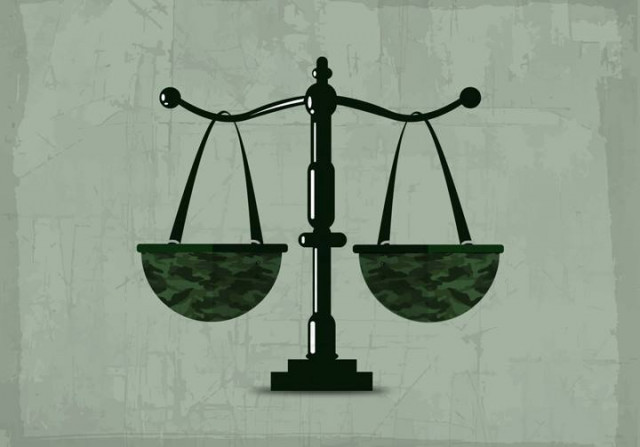Court challenge: Larger bench to decide fate of military courts
SC gives Islamabad Capital Territory three days for filing a concise statement.

PHOTO: CREATIVE
The apex court’s larger bench will decide the fate of military courts, which have been established through the 21st constitutional amendment to try the civilians who wage war against the state in the name of religion or sect.
The Supreme Court’s three-judge bench – headed by Justice Anwar Zaheer Jamali – on Tuesday referred the matter to Chief Justice of Pakistan Justice Nasirul Mulk and requested him to constitute a larger bench to hear several constitutional petitions against the 18th and 21st constitutional amendments.
The bench also gave three-day time to the Islamabad Capital Territory’s (ICT) advocate general for filing a concise statement in reply to the pleas, including one filed by Lahore High Court Bar Association (LHCBA), against the establishment of military courts.
During the hearing, the bench was told that federal and all provincial governments have submitted their concise statements.
However, the court showed its displeasure at the Sindh government filing its concise statement in the SC’s Karachi Registry, saying there was no reason to file the statement in Karachi when the hearing of the case was fixed in Islamabad.
It also hinted at taking up the plea against the 18th constitutional amendment prior to the 21st constitutional amendment case.
However, Iftikhar Gilani, Khyber-Pakhtunkhwa’s (K-P) counsel in the 18th amendment case, stated that a full court had passed an order in the 18th amendment case and it has already been implemented.
The LHCBA counsel Hamid Khan requested the bench to list the case for hearing in the next week. Upon this, Justice Jamali said the matter is being referred to chief justice and he will constitute the larger bench.
A day earlier, the federal government and three provinces had submitted before the top court their concise statements in support of the military courts. The federation had claimed that the existing civilian law enforcement structure is inadequate and cannot effectively prosecute, convict and sentence terrorists.
It had also contended that abridgment of fundamental rights was recognised in certain circumstances under the country’s constitutional dispensation.
Published in The Express Tribune, February 25th, 2015.



















COMMENTS
Comments are moderated and generally will be posted if they are on-topic and not abusive.
For more information, please see our Comments FAQ